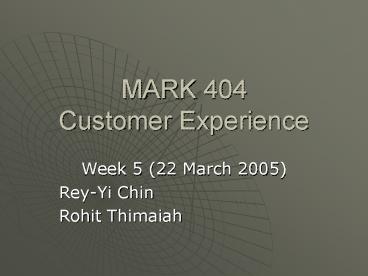MARK 404 Customer Experience - PowerPoint PPT Presentation
1 / 16
Title:
MARK 404 Customer Experience
Description:
The interpretation of a user's complete encounter with the site, from the ... experience, including decisions such as whether to abandon a shopping cart. ... – PowerPoint PPT presentation
Number of Views:20
Avg rating:3.0/5.0
Title: MARK 404 Customer Experience
1
MARK 404Customer Experience
- Week 5 (22 March 2005)
- Rey-Yi Chin
- Rohit Thimaiah
2
The Seven-Stage Cycle of Internet Marketing
3
Customer Experience
- What is it?
- The interpretation of a users complete encounter
with the site, from the initial look at the
homepage through the purchase experience,
including decisions such as whether to abandon a
shopping cart.
4
Seven Key Elements (www.cuisine.co.nz)
- The Objective Element the basic functionality
- The Perception Element individual
interpretation of each encounter with a firm - The Encounter Element process and output
measures of the shopping experience - The Reactions-to-Stimuli Element customers
response to the ambience of the website layout - The Sensory Element evaluation of customer
needs and expectation online - The Cognitive and Emotional Element customers
logical (thought evaluation) and emotional
(moods, attitudes, and feelings) reactions - The Relative Element customers reaction to
various stimuli during a website visit or a
purchase
5
The Experience Hierarchy
- Stage One Experiencing Functionality
- The Site Works Well
- - Usability and ease of navigation
- - Speed
- - Reliability
- - Security
- - Media accessibility
6
The Experience Hierarchy (cont.)
- Stage Two Experiencing Intimacy
- They Understand Me
- - Customization
- - Communication
- - Consistency
- - Trustworthiness
- - Exceptional Value
- - Shift from consumption to leisure activity
7
The Experience Hierarchy (cont.)
- Stage Three Experiencing Evangelism
- I love to share the story
- - Taking the word to the market
- - Active community membership
- - The company cares about my opinions
- - Defender of the Experience
8
Summary Hierarchy of Customer Experience
- Exhibit 4.1
Stages
If a Firm Gets This Right
This Is What the Customer Experiences
Stage One Functionality
Site is easy to use
Design and information architecture
l
l
Deep understanding of customer needs
Quick downloads
l
l
Platform independence
Intuitive navigation
l
l
Efficient transactions
Site reliability
l
l
Stage Two Intimacy
Warehousing and mining
Personalization
l
l
Tailoring of pages and offerings
Increasing trust
l
l
Overlay human interaction
Repeated experiences of exceptional value
l
l
Integrated data
A sense of being in the know
l
l
Consistent performance over time
Consistent experiences
l
l
Constant innovation and upgrading
Significant benefits relative to other offerings
l
l
(incremental or significant)
Stage Three Evangelism
Support of evangelists Acknowledgment of
evangelists
Desire to take message to the market
l
l
Community benefits
l
l
9
Steps in the Process of Creating a Desirable
Customer Experience
- Step One Create a rich description of the target
customer - Know who your customers are
- Make all constituents familiar with customer
attributes - Marketing research
10
Steps in the Process of Creating a Desirable
Customer Experience
- Step Two Develop Use-Case Scenarios for Each
Target Segment - Think of scenarios that influence a customer to
go to the website - Put yourself in customers shoes
11
Steps in the Process of Creating a Desirable
Customer Experience
- Step Three Effectively Integrate the Online and
Offline Experience - Online and offline customer experience must be
integrated (Customer-facing and Back office) - Incorporate the advantages of both online and
offline offerings - Integrating various channels and database
information to enhance the overall customer
experience
12
Steps in the Process of Creating a Desirable
Customer Experience
- Step Four Articulate Clear Stages of Desired
Experience - Identify generic desired customer experience and
deliver them - Familiar with three stages of Customer Experience
13
Steps in the Process of Creating a Desirable
Customer Experience
- Step Five Effectively Assess Relative Levels of
Hierarchy - Categorise customer into one of the three stages
- Use site-usage patterns or survey instruments
14
Steps in the Process of Creating a Desirable
Customer Experience
- Step Six Highly Leverage the Evangelists
- Is Evangelists always profitable for the firm?
- - directly indirectly
- Freedom to co-evolve the experience
- Freedom to confront and challenge the firm
- Preferred access to new ideas within the firm
- Trickiness of economic incentives
- Shrines, clubs, museums, and other third places
15
Steps in the Process of Creating a Desirable
Customer Experience
- Step Seven Continuously Monitor and Adjust
- It is a must due to changing competition,
technology, and customer knowledge
16
Example www.cuisine.co.nz































